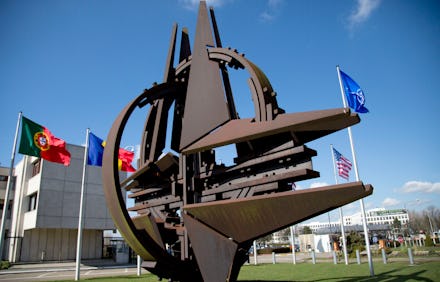NATO Pros and Cons: Dissecting what Trump says about the treaty

President-elect Donald Trump rattled many European leaders and foreign policy experts on the campaign trail when he said he wasn't so sure the United States should be backing up its NATO allies anymore.
Trump reportedly takes issue with the amount of money that the U.S. pays for the alliance compared to the other 27 member countries.
"I think NATO may be obsolete," Trump told Bloomberg back in March. "NATO was set up a long time ago — many, many years ago when things were different. Things are different now. We were a rich nation then. We had nothing but money. We had nothing but power. And you know, far more than we have today, in a true sense. And I think NATO — you have to really examine NATO. And it doesn't really help us, it's helping other countries. And I don't think those other countries appreciate what we're doing."
NATO, or the North Atlantic Treaty Organization, was formed in 1949 after World War II as a way to protect European allies in the region against the Soviet Union. The treaty was put into action after Sept. 11, 2001, when NATO allies agreed to participate in U.S. military operations against Osama bin Laden in Iraq and again during the invasion of Iraq in 2003.
Headquartered in Brussels, NATO now has a budget of approximately $2.8 billion a year. The U.S. pays 3.61% of its gross domestic product towards that.
"Every ally spending less than 2% of their GDP needs to dig deeper and make a concrete commitment to do more," Secretary of State John Kerry said at NATO headquarters in Brussels in 2014. "And all you have to do is look at a map in order to understand why – Ukraine, Iraq, Syria – all threats to peace and to security, and they surround the region."
After meeting with Trump at the White House last week, President Barack Obama said during a press conference that the president-elect assured him that he would not abandon the alliance.
"In my conversation with the president-elect, he expressed a great interest in maintaining our strategic relationships. So one of the messages I will be able to deliver is his commitment to NATO and the transatlantic alliance," Obama said, referring to his trip to Greece and Germany this week.
During a speech in Brussels in early October, Kerry seemed to reiterate Trump's concerns over the economic impact of NATO.
"It's also critical to remember, in 2016 – and looking to the future – you can't separate economic challenges from the security threats that we also face," Kerry said. "And here, too, the smartest response to common danger is to combine our strengths."
In a op-ed for the Guardian just days after the U.S. election, NATO Secretary General Jens Stoltenberg urged Trump to remain committed to the alliance and said that several member nations have begun to step up their spending.
For 67 years this partnership has been the bedrock of peace, freedom and prosperity in Europe. It enabled us successfully to deter the Soviet Union and bring the Cold War to an end. And it made possible the integration of Europe and laid the foundation for the unprecedented peace and prosperity we enjoy today. European leaders have always understood that when it comes to security, going it alone is not an option.